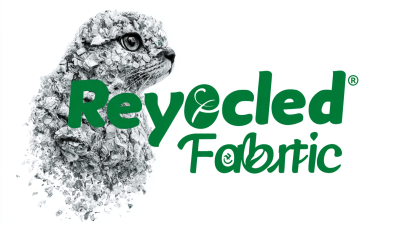In today's world of fashion and textiles, the significance of sustainability cannot be overstated, and one innovative material that stands at the forefront is Recycled Polyester Fabric. As consumers become increasingly aware of their environmental footprint, the demand for eco-friendly alternatives continues to rise. This ultimate guide explores the many benefits of Recycled Polyester Fabric, including its durability, versatility, and reduced environmental impact compared to traditional polyester. We will delve into the latest trends shaping the industry, as well as provide practical tips for incorporating recycled polyester into your wardrobe or business practices. By understanding the advantages and implications of this revolutionary fabric, we can all contribute to a more sustainable future without compromising on style or functionality. Join us as we uncover the transformative power of Recycled Polyester Fabric and its role in fostering a greener planet.

Recycled polyester, made primarily from post-consumer plastic bottles, is garnering attention for its sustainability benefits. The process begins with the collection of plastic waste, which is then cleaned, shredded, and transformed into small pellets. These pellets are melted and extruded into new polyester fibers, ready to be woven into various fabrics. According to a report by Textile Exchange, the global production of recycled polyester reached 6 million metric tons in 2020, showing a significant increase in consumer demand for sustainable options.
When considering the impact of recycled polyester, it's essential to acknowledge its role in reducing waste and lowering carbon emissions. The production of recycled polyester uses up to 59% less energy compared to virgin polyester, making it an eco-friendly choice. Additionally, for every ton of recycled polyester produced, approximately 4,800 plastic bottles are diverted from landfills and oceans.
**Tips:** When selecting products made from recycled polyester, look for certifications such as GRS (Global Recycled Standard) to ensure quality and impact. Also, support brands that transparently share their supply chain practices, as this fosters greater accountability in the industry. Lastly, consider the longevity of garments; choosing durable recycled polyester items can further enhance their sustainable footprint by reducing the frequency of replacement.
This chart illustrates the growth of the global recycled polyester market from 2020 to 2024, highlighting an increasing focus on sustainability and circular fashion initiatives. The data reflects the industry's response to environmental concerns, with significant investments flowing into recycled materials.
Recycled polyester fabric has emerged as a sustainable alternative to virgin polyester, significantly reducing environmental impact. According to a report by the Textile Exchange, switching to recycled polyester can decrease energy consumption by up to 60% and reduce greenhouse gas emissions by approximately 32% compared to using virgin polyester. This shift not only minimizes plastic waste in landfills but also conserves natural resources, making it a crucial step toward a more sustainable fashion industry.
For consumers looking to make environmentally conscious choices, here are some tips: First, always check the labels on fabrics to ensure they are made from recycled materials. Look for certifications like Global Recycled Standard (GRS) that verify the authenticity of recycled content. Additionally, consider supporting brands that prioritize transparency and sustainability in their production processes. Organizations like the Ellen MacArthur Foundation highlight the importance of circular fashion systems, which recycle existing materials, creating a more responsible consumption cycle.
By opting for recycled polyester, we can collectively contribute to reducing our carbon footprint and promoting a healthier planet. The positive impact on water conservation is noteworthy as well; producing recycled polyester uses about 86% less water than creating virgin polyester. Embracing these eco-friendly fabrics is essential for paving the way towards a sustainable future in the textile industry.
The fashion industry is undergoing a significant transformation as brands increasingly embrace recycled polyester due to its sustainability credentials. This trend is not merely a passing fad; it reflects a growing awareness of environmental issues and a commitment to reducing textile waste. By reusing plastic bottles and other waste materials, recycled polyester fabrics offer a compelling alternative to virgin polyester, with the added benefit of requiring less energy and water during production.
**Tip:** When shopping for sustainable fashion, look for labels that indicate the use of recycled materials. This will not only support eco-friendly practices but also promote innovation in the industry.
Further, recycled polyester is becoming more versatile, appearing in various fashion items from activewear to high-end couture. Designers are experimenting with this fabric, creating stylish and functional pieces that appeal to eco-conscious consumers. This shift is a key driver in the push towards a circular economy in fashion, encouraging brands to rethink their production processes and resource management.
**Tip:** Consider investing in high-quality pieces made from recycled polyester. These items often last longer and contribute less to landfill waste compared to their conventional counterparts.
| Aspect | Details |
|---|---|
| Material Source | Post-consumer plastic bottles and recycled textiles |
| Key Benefits | Reduces waste in landfills, conserves resources, lower carbon footprint |
| Market Growth | Expected annual growth rate of 8.9% in the recycled polyester segment |
| Current Trends | Increasing use in athletic wear and fast fashion |
| Sustainability Impact | Potential to reduce water and energy consumption in production |
| Consumer Awareness | Growing demand for eco-friendly products among consumers |
| Challenges | Quality consistency, costs of production, and consumer perceptions |
The use of recycled polyester fabric has gained traction in the fashion and textile industries due to its perceived environmental benefits, but it is important to address the challenges and limitations associated with this material. One significant concern is the quality of recycled polyester, which can vary depending on the source of the recycled materials. Products made from lower-quality recycled inputs may not hold up as well in terms of durability and longevity compared to virgin polyester. This variability can lead to consumer dissatisfaction and increased waste, undermining the sustainability goals that recycling aims to achieve.

Another critical limitation lies in the recycling process itself. While recycling polyester can divert waste from landfills, the process often requires considerable energy and resources. Furthermore, the presence of mixed materials in garments complicates the recycling process, sometimes resulting in downcycling, where the recycled product is of lesser quality and utility. Additionally, the availability of technology and infrastructure for recycling textiles is still limited in many regions, restricting the potential for widespread adoption of recycled polyester fabric. Addressing these challenges is essential for maximizing the positive environmental impact of recycled materials while advancing the sustainability agenda in the fashion industry.
The future of recycled polyester is bright, driven by a wave of innovations in textile technology and sustainability practices. As brands and manufacturers increasingly prioritize environmental responsibility, the development of advanced recycling methods has opened up new avenues for sourcing materials. Innovations such as chemical recycling enable the decomposition of polyester back into its original monomers, making it possible to create high-quality fibers from post-consumer plastic waste. This not only reduces reliance on virgin petroleum resources but also minimizes the environmental impact of textile production.
Sustainability practices surrounding recycled polyester are also evolving rapidly. Many companies are embracing circular economy principles, ensuring that products can be reused or recycled at the end of their life cycle. Initiatives like take-back programs and partnerships with recycling facilities encourage consumers to return their used garments, reducing landfill waste. Furthermore, the rise of eco-friendly certifications and transparent supply chains empowers consumers to make informed choices, promoting a culture of sustainability. As awareness grows and technology advances, recycled polyester stands as a testament to the potential for innovation in creating a more sustainable fashion industry.







